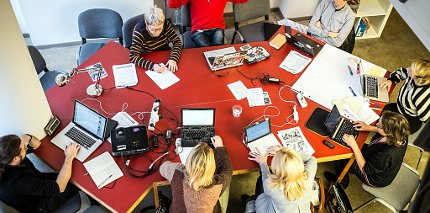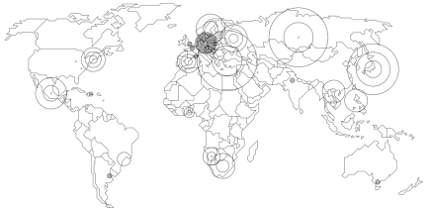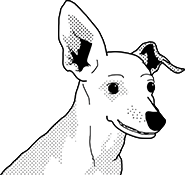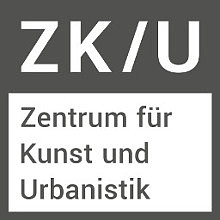Es tut weh
, singt die Frontfrau der Popgruppe Glashaus, zaghaft und dennoch leidend. Es ist was es ist
, sagt die Liebe, bzw. Erich Fried. Es ist so dunkel …
soll Goehte in seinen letzten Atemzuegen liegend gefluestert haben. weiterlesen »
- An/Greifbar: Warum BerlinerInnen gegen die digitale Kolonialisierung ihrer St…
- Hacking Women: Ein Blick über den Tellerrand der männlich dominierten Compu…
- Abschaffung der Arbeit? Künstliche Intelligenz, Kapitalismus und Transhumani…
- SILENT WORKS: Berliner Gazette Jahresprojekt zu verborgener Arbeit im KI-getr…
- Gemeinsam machen: Wie die feministischen Prinzipien des Internets entstanden …
- In der Schneekugel: Wie Literatur virtuelle Räume erinnern, erschaffen und n…
- Klimawandel und Selbstkritik: "Wir gedeihen, uneingeladen, wo wir nie wachsen…
- Bild des Monats: Warum wir im Jahr 2020 noch viel mehr Gretas brauchen werden…
- Am Ground Zero des Klimawandels: Green Grabbing, Massenmigration und die Roll…
- Jenseits des Menschengemachten: Indigene Kosmologien als Roadmap für die Kli…
-
Looking for it
-
Abgelichtet
Also ich bin der Andre, wa. Und ich hatte eine kleine Kamera, die ich ins Nachtleben mitnahm. Daraus wurde ein Hobby. Spaeter auch ein Broterwerb.Seit Jahren schon kann man das kostenlose Stadtmagazin Flyer in der Mitte aufschlagen und blickt auf zwoelf Fotos, die ich gemacht habe. Eine Art Centerfold. Die Fotos zeigen feiernde junge Menschen in den angesagten Berliner Clubs. Schicke Menschen an schicken Orten. weiterlesen »
-
Per Du
Wenn ein Weltmeister in irgendeinem Sportzweig abermals an den Kaempfen teilnimmt, welche ihm vordem den stolzen Titel einbrachten, dann nennen die Sportberichter ihn den Titelverteidiger, die diesbezueglich Muehen aber heissen als Ganzes: die Titelkaempfe. Wir hatten auch Titelkaempfe und der Schreiber ist hier ein Titelverteidiger. Er hat aber keinen Weltmeistertitel zu verteidigen sondern nur einen bescheidenen Anfaengertitel, den du-Titel. Man kann zumindest nicht sagen, dass wir den Titel unserer schweizerischen Monatszeitschrift weit hergeholt haben. Etwas Naheliegenderes kanns ausser dem lieben
Ich
ja nicht geben. weiterlesen » -
Ich bin ein Medium
Click, Du hast mich geoeffnet. Vielleicht ist das heute das erste Mal? Wahrscheinlich nicht. Wahrscheinlich kennen wir uns schon laenger. Mein Format hast Du vermutlich schon schaetzen gelernt, denn ich gehe oekonomisch mit Deiner Zeit um. Ich bin ephemer, fluechtig. Nachdem Du mich gescannt hast, legst Du mich vielleicht irgendwo ab oder loeschst mich direkt nach der e-Speed Lektuere. weiterlesen »
-
Wie heisst Du nochmal?
Extra, extra! Read all about it! Wirtschaftswissenschaftler haben jetztherausgefunden, worauf unsere Vergesslichkeit im Alltag zurueckzufuehren ist. Was Verhaltenspsychologen seit Jahren zu entraetseln versuchen, hat ein Team an der Business Harvard School entschluesselt: Spontane Amnesie, wie Experten das Phaenomen zu nennen pflegen, ist keine Krankheit, noch weniger ist es eine Schwaeche. Es handelt sich dabei um eine wohlkalkulierte Kommunikationsstrategie, die sich der hochgezuechtete Homo Sapiens zwecks Optimierung seiner oekonomischen Performanz antrainiert hat. weiterlesen »
-
Digitales Fanzine? “Es geht um Alternativen zur Alternative.”
Der bevorstehende Relaunch der Berliner Gazette wird zum Anlass genommen, um die kurze, aber spannende Geschichte des digitalen Mini-Feuilletons im Rahmen der transmediale.02 Revue passieren zu lassen. Das Redaktionsteam stellt sich vor und diskutiert zusammen mit Gerrit Gohlke, dem Leiter des Media Arts Lab im Kuenstlerhaus Bethanien, Strategien der Oeffentlichkeitsbildung im elektronischen Briefformat. Gerrit Gohlke formuliert im Vorfeld ein paar einleitende Gedanken zum Thema. weiterlesen »
-
Mission
Does the internet foster a thinking „outside of the box“? This question motivates Berliner Gazette to analyze and test emerging cultural practices. As a nonprofit and nonpartisan association of journalists, researchers, artists and coders we publish berlinergazette.de in German under a Creative Commons-License – with more than 900 contributors from all over the world. For more than 15 years we also organize conferences (e.g. Slow Politics), workshops, edit books, etc.
Background
How can you get people out of their “caves”? How do you get them to emerge from their enclosed environments and partial public spheres, their clubs and cliques, their social and cultural routines? And somehow bring them together across boundaries? The answer is: With the help of media, for example. At least they have the potential to do so. The Berliner Gazette e.V. works toward realizing this potential.
In this context, the Internet is of particular importance. More and more people gain access to it and thus gain access to the processes of global networking and digitalization – processes that are not only changing the landscape of media but also society as a whole. In the 20th century, mass media provided platforms for communication and reflections of society. At the beginning of the 21st century major newspapers and similar (public) entities are hardly able to perform this integrative task. As a matter of fact, they increasingly lose the trust of the masses, who begin to focus on small digital-networked media.
But how can such media be used to think outside of the box and reflect the interests of society? This question leads the Berliner Gazette e.V. to analyze groundbreaking features of media in the era of the Internet and to test them in practice. Against this backdrop the nonprofit and nonpartisan association weaves its social networks – offline and online, locally and globally.
History
At the end of the 1990s, the cultural scene in Berlin had no platform on the Internet. First online projects had already failed, the commercialization of the Internet was progressing. Facing these conditions, Krystian Woznicki started a new publishing project. Its aim was to take both the social dynamics of the Internet and the idea of the classic feuilleton seriously (the culture section of the conventional newspaper). Thus, in July 1999, Woznicki founded, within the online community Kulturserver, the Berliner Gazette.
At first, Woznicki’s project took the form of a weekly electronic newspaper: not a newsletter, but a weekly feuilleton in the form of an e-mail, delivered every Wednesday to its readers’ mailboxes. Choosing the content, the editorial staff followed guidelines still relevant today: turning readers into authors, while also inviting outsiders to become authors. In order to distribute the content, the staff also seeks synergies with various offline formats: symposiums, anthologies, etc. In this way, the network of the Berliner Gazette has continued to grow – leaving the physical boundaries of Berlin far behind.
When in 2002 – after the crash of the new economy – the Internet was declared dead by many, the Berliner Gazette presented itself with an extended Web site. The staff launched Germany’s first collective blog and systematized their thematic work: the editors interview representatives of various sectors of cultural innovations ((sub-)politics, economy, technology, art, science) on annual focus themes and publish weekly protocols of these interviews. Be it “Work,” “Language,” “Time” or “Water” – the annual themes continue to question important issues of our time as the commons of the 21st century.
In the press
The voice of Post-Germany.
Geert Lovink/fibrecultureA new form of journalistic intervention.
Christoph Dreher/Digital SpiritSmart selection of authors.
Anne Heaming/fluter.de -
Go Public!
Der eine oder die andere wird sich vielleicht erinnern, dass ich vor 16 Monaten, im Herbst 2000, hier schon einmal eine Kolumne schreiben durfte, damals als frisch gebackener kuenstlerischer Leiter der transmediale, mit dem ersten scharfen Berliner Wind in der Nase. Die transmediale.01 ist gluecklich ueber die Buehne gegangen, inklusive einer im Nachhinein gedruckten Buchdokumentation, und wir stehen im Moment in den Startloechern fuer die transmediale.02, die am 5. Februar im Haus der Kulturen der Welt eroeffnet werden wird. weiterlesen »
-
Executive Board
Florian Kosak, born in 1983, studied business administration at SRH University Berlin. Experience in event management and e-commerce. 2004 – 2008, project manager in an agency for event marketing. Since 2005, chief executive officer (CEO) of a company in the field of e-commerce. Volunteer business executive of the Berliner Gazette e.V.
Magdalena Taube, born in 1983, studied modern German literature and British and American sciences at Humboldt University Berlin. Experience in the field of (online) journalism. 2007 – 2009, culture and media editor of du-machst.de, an online platform for youth empowerment initiated by the Federal Ministry for Families. Since 2009, culture editor of Kulturportal Deutschland, a platform for cultural producers. Volunteer chief editor of the Berliner Gazette.
Krystian Woznicki, born in 1972, studied Islamic and Asian sciences as well as Spanish at Humboldt University Berlin. Experience as curator, writer, editor, lecturer. 1995 – 1998, Tokyo correspondent for Spex. 1997, curator of the “Young Japanese Cinema”-festival at the museum of film in Antwerp. 2002 – 2005, co-publisher of a reader-series by etc.publications. Author of several books on globalization. Most recent publications: “Abschalten” (“Disconnect”, 2008) and “Wer hat Angst vor Gemeinschaft?” (“Who is afraid of community?”, 2009). Volunteer chairman of the Berliner Gazette e.V.

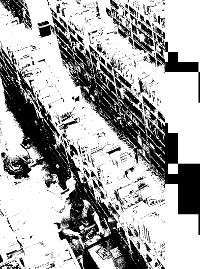


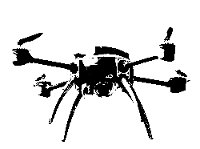
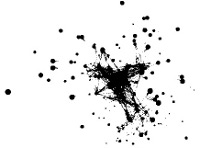
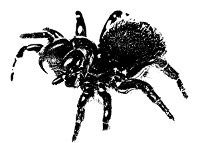
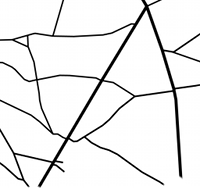
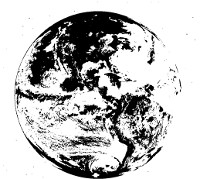
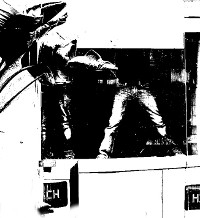
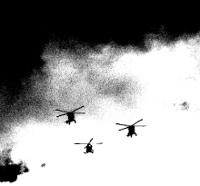
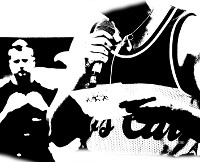
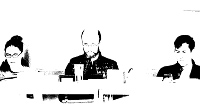

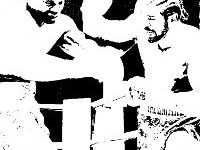 KOMPLIZEN
KOMPLIZEN